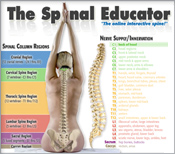| Carpal Tunnel and the Chiropractic Lifestyle How specific chiropractic care can help. The major nerve controlling the thumb, index, and parts of the middle, and ring finger is called the median nerve. From the tip of your fingers, it travels through the bones in your wrist, past your elbow, up your arm, through your shoulder and neck, and finally to your spinal cord. Problems can develop in one or more of these areas. The carpal “tunnel” is formed by bones in the wrist. The median nerve, tendons, and blood vessels pass through this opening. If one or more of the bones forming this tunnel should “collapse”, inflammation, nerve pressure, and painful symptoms can result. The median nerve connects to the spinal cord through openings between several bones in the lower neck. When these spinal bones lose their normal motion or position, they can cause problems in the fingers and wrist. After a thorough examination, your chiropractic doctor will perform specific adjustments where needed, to help normalize structure and reduce nerve irritation. When given time, conservative, chiropractic care has produced excellent results with carpal tunnel problems—without drugs or surgery. Repetitive hand and wrist motion. Every day, assembly line workers, keyboard operators, grocery store clerks, and many others, receive micro-traumas to their hands and wrists. Vibration and repetitive motions, when combined with spinal problems and other joint dysfunction, can result in a condition known as carpal tunnel syndrome. Symptoms may include pain, numbness, tingling, weakness, or a loss of strength in the hands. If placing your hands back to back produces an increase in numbness, tingling or pain, you could have a carpal tunnel problem. Have someone try to pull your thumb and finger apart. If your fingers seem weak, it could be related to a carpal tunnel problem. Specific tests will be performed to see if spinal nerves are involved. Specific chiropractic adjustments can help return malfunctioning joints to a more normal motion and position. THE CHIROPRACTIC LIFESTYLE Chiropractors are experts in the care of the bones, nerves, muscles and connective tissues that make up about 60% of your body. All of the joints in your body are part of this musculo-skeletal system and its optimal function is necessary for overall good health. Ask your Doctor of Chiropractic for more information about a care program that may include specific spinal adjustments, exercise recommendations, nutritional advice or other conservative methods of care based on your health history, age, current condition and lifestyle.
REFERENCES:
Bonebrake, A., D.C., Fernandez, J., D.C., A Treatment for Carpal Tunnel Syndrome, Results of a Follow-up Study, Journal of Manipulative Physiological Therapeutics, 16:125-139, 1993. Cailliet, R., M.D., Hand Pain and Impairment, 3rd edition, F.A. Davis Company, 1983. Cailliet, R., M.D., Pain; Mechanisms and Management, F.A. Davis Company, 1993. Kendall, F., McCreary, E., Muscle Testing and Function, 3rd edition, Williams and Wilkins, 1983. Kirk, R., D. C., Lawrence, D., D. C., Valvo, N., D. C., States' Manual of Spinal, Pelvic and Extravertebral Technics, 3rd edition, National College of Chiropractic, 1991. Norkin, C., P.T., Levrangie, P., P.T., Joint Structure and Function: A Comprehensive Analysis, 2nd edition, F. A. Davis Company, 1992.
©2002 Back Talk Systems, Inc. (800) 937-3113 (303) 277-9990 www.backtalksystems.com |
1750 West Broadway Street, Suite 108 | Oviedo, Florida 32765
Tel: (407) 977-7233 | Fax: (407) 359-6822
Office Hours - call for appointment times
Oviedo Florida Chiropractor Chiropractors Chiropractic Doctors
Copyright 2024 - ChiroPlanet.com
Privacy Notice - Admin

